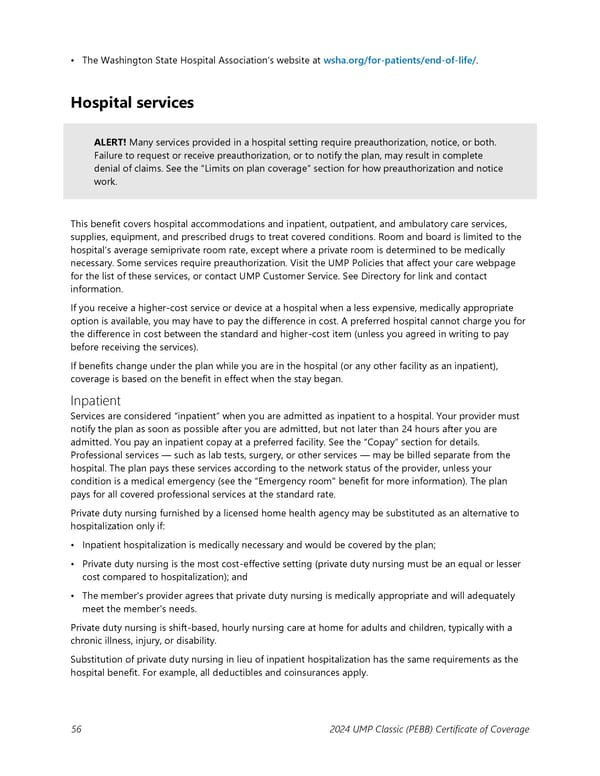• The Washington State Hospital Association’s website at wsha.org/for-patients/end-of-life/. Hospital services ALERT! Many services provided in a hospital setting require preauthorization, notice, or both. Failure to request or receive preauthorization, or to notify the plan, may result in complete denial of claims. See the “Limits on plan coverage” section for how preauthorization and notice work. This benefit covers hospital accommodations and inpatient, outpatient, and ambulatory care services, supplies, equipment, and prescribed drugs to treat covered conditions. Room and board is limited to the hospital’s average semiprivate room rate, except where a private room is determined to be medically necessary. Some services require preauthorization. Visit the UMP Policies that affect your care webpage for the list of these services, or contact UMP Customer Service. See Directory for link and contact information. If you receive a higher-cost service or device at a hospital when a less expensive, medically appropriate option is available, you may have to pay the difference in cost. A preferred hospital cannot charge you for the difference in cost between the standard and higher-cost item (unless you agreed in writing to pay before receiving the services). If benefits change under the plan while you are in the hospital (or any other facility as an inpatient), coverage is based on the benefit in effect when the stay began. Inpatient Services are considered “inpatient” when you are admitted as inpatient to a hospital. Your provider must notify the plan as soon as possible after you are admitted, but not later than 24 hours after you are admitted. You pay an inpatient copay at a preferred facility. See the “Copay” section for details. Professional services — such as lab tests, surgery, or other services — may be billed separate from the hospital. The plan pays these services according to the network status of the provider, unless your condition is a medical emergency (see the “Emergency room" benefit for more information). The plan pays for all covered professional services at the standard rate. Private duty nursing furnished by a licensed home health agency may be substituted as an alternative to hospitalization only if: • Inpatient hospitalization is medically necessary and would be covered by the plan; • Private duty nursing is the most cost-effective setting (private duty nursing must be an equal or lesser cost compared to hospitalization); and • The member's provider agrees that private duty nursing is medically appropriate and will adequately meet the member's needs. Private duty nursing is shift-based, hourly nursing care at home for adults and children, typically with a chronic illness, injury, or disability. Substitution of private duty nursing in lieu of inpatient hospitalization has the same requirements as the hospital benefit. For example, all deductibles and coinsurances apply. 56 2024 UMP Classic (PEBB) Certificate of Coverage
 UMP Classic COC (2024) Page 56 Page 58
UMP Classic COC (2024) Page 56 Page 58